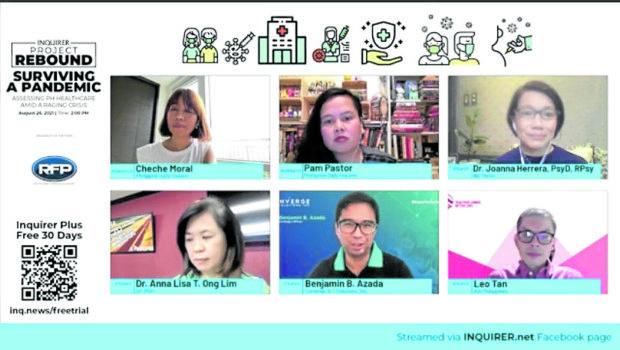COVID-19 shines spotlight on tech, health needs

The Inquirer Group hosts webinar on “Surviving a pandemic: Assessing PH health care amid a raging crisis” as part of Project Rebound.
As devastating as the COVID-19 pandemic has been, it also proved once again that in crisis there is opportunity.
Key players in the health and wellness field said during a recent Inquirer Project Rebound webinar that COVID-19 hastened the adoption of new health and medical technologies and underscored the fact that health was more than just physical but also mental.
The pandemic also made people realize that their own health depended on the health of those around them. And they began to truly appreciate planning for the future, like an insurance coverage that could be both an investment in the future and a hedge against emergencies.
During the webinar on “Surviving a pandemic: Assessing PH health care amid a raging crisis”, Dr. Anna Lisa Ong-Lim, a pediatric infectious disease expert at the University of the Philippines Philippine General Hospital, said, “People have always recognized the need for health protection [and] the pandemic really made it important.”
But she said there was a need for people to have something to fall back on in times of health emergencies, like health maintenance organizations, insurance or PhilHealth (Philippine Health Insurance Corporation).
Dr. Joanna Herrera of We Thrive, a group of mental health professionals and advocates who help individuals cope with mental health and related issues, said the pandemic encouraged more people to value health, including mental well-being.
“Although many were still reluctant to invest in mental health, the younger generation is learning to value employers who provide mental health service at this time of crisis,” she said.
Leo Tan, chief marketing officer of AIA Philippines, said people’s appreciation of the need for protection through their insurance plans increased. “COVID-19 made them realize that the unexpected could happen. As the health crisis became an economic crisis, people realized the need for emergency funds …”
People showed more interest in medical coverage, he said, unlike before when they thought of insurance as a way to save for some big-ticket future projects. “There was a change in mindset.”
Technology, said Benjamin Azada, chief strategy officer of Converge ICT Solutions, Inc., a telecommunications service provider, became the backbone and enabler of the economy and other sectors.
Before the crisis, people paid for connectivity for individual devices. As the pandemic reduced mobility, kept people home-bound and work-from-home arrangements grew, families realized it was more economical to spend on a shared fixed broadband connectivity for a monthly fee.
Azada said he expected that the number of broadband users would grow even after the pandemic.
Ong-Lim said technology had seen the rise in the use of telemedicine, which allowed virtual consultations and diagnosis, among others. “Now more people are availing [themselves] of telemedicine [though many, including professionals were still grappling with the process,” she said.
Improved connectivity, Herrera said, allowed mental health professionals to serve clients in different parts of the country. Unfortunately, she said, there were not enough experts—only one for every 100,000 Filipinos—to meet the demand for mental health services.
The pandemic, Ong-Lim said, showed that “Filipinos will try to cope as much as possible. They will try to provide for as long as they are able” until they realized their resources were limited and there were certain constraints to overcome.
While the pandemic raised awareness and made available new mental health services, Herrera said there was a need for “greater parity” or equitable distribution of such benefits. “The government has to step in” and make mental health a community, even national, care issue. At the moment, services were often paid for personally by those who sought them.
Azada said a crisis like COVID-19 required a “whole of government, whole of country approach.”
Tan said people should realize protecting themselves was not just about themselves individually but their family, community and country. Thus, AIA Philippines wanted to be a partner in a total health protection, prevention and promotion program and wanted to make its services available to everyone. “As a company we are not just about the bottom line [profits] … We will be doing well by doing good,” he said.
Herrera said community action was needed to ensure protection and safety. “Think about others and the greater good.” INQ
The Inquier Project Rebound webinar was hosted by Cheche Moral, Lifestyle editor, and Pam Pastor, assistant Lifestyle editor.
For more news about the novel coronavirus click here.
What you need to know about Coronavirus.
For more information on COVID-19, call the DOH Hotline: (02) 86517800 local 1149/1150.
The Inquirer Foundation supports our healthcare frontliners and is still accepting cash donations to be deposited at Banco de Oro (BDO) current account #007960018860 or donate through PayMaya using this link.
